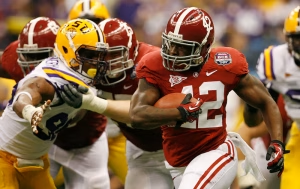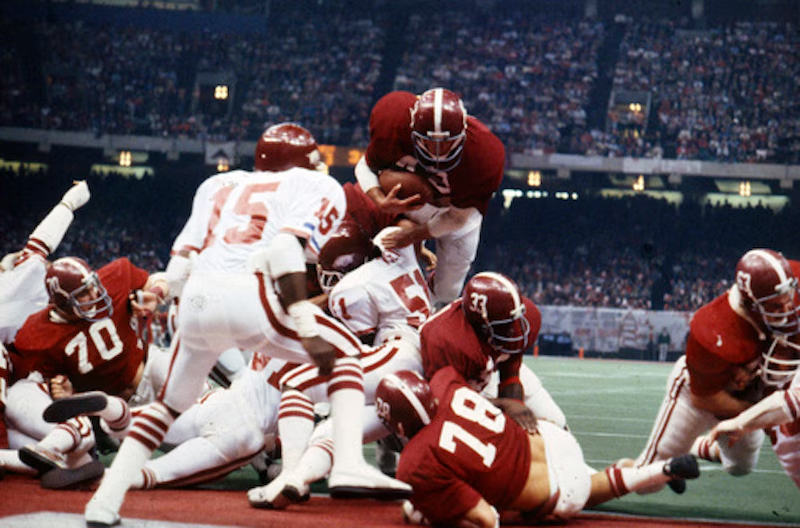Before the Statues and Spotlight: How Two Unlikely Legends Quietly Wore the Same Number and Left an Unshakable Mark on Alabama Football History
One Number, Two Eras — What You Never Knew About Alabama’s Most Overlooked Legacy
In the storied annals of Alabama football, names like Namath, Ingram, Henry, and Young dominate the headlines. Yet beneath the statues and championship banners lies a lesser-known thread that weaves through generations: the quiet legacy of the number 42. And the two men who wore it — Major Ogilvie and Eddie Lacy — couldn’t have been more different in style or era, yet both left an unshakable mark on Crimson Tide history.
While the sports world often associates No. 42 with Jackie Robinson, Alabama fans might remember it for something else entirely: relentless power, championship pedigree, and quiet leadership. In an ongoing countdown of iconic numbers in Crimson Tide history, few resonate more than this.

🏈 Major Ogilvie: The Original No. 42 and the Bear Bryant Era
A Birmingham native and Mountain Brook High School legend, Major Ogilvie arrived at Alabama in the late 1970s — a time when Coach Paul “Bear” Bryant’s wishbone offense ruled the SEC. Despite sharing the backfield with stars like Tony Nathan and Johnny Davis, Ogilvie’s name always found its way into the end zone.
In fact, Ogilvie remains the only player in Alabama history to score a touchdown in four consecutive bowl games — a feat that speaks volumes about his consistency and ability to show up when the lights were brightest.
He helped power Alabama to two national championships (1978 and 1979), scoring pivotal touchdowns in both title-clinching Sugar Bowl wins. In the 1980 Sugar Bowl against Arkansas, Ogilvie scored twice and earned MVP honors, capping off a perfect 12–0 season.
Though he never rushed for more than 97 carries in a single year due to Bryant’s heavy rotation system, Ogilvie left with 1,718 career rushing yards and 25 touchdowns — and a reputation as one of the most underrated backs in Crimson Tide lore.
🏆 Eddie Lacy: The Powerhouse of the Saban Dynasty
Fast forward more than three decades to the Nick Saban era, and another No. 42 was preparing to etch his name into Alabama history — this time with brute strength and unmatched postseason dominance.
Eddie Lacy, a New Orleans native displaced by Hurricane Katrina, found his way to Tuscaloosa in 2009 as part of a stacked backfield that included Mark Ingram and Trent Richardson. Despite waiting behind two future NFL stars, Lacy bided his time — and when his turn came, he made it count.
In 2012, Lacy took over as lead back and bulldozed his way to 1,322 rushing yards and 17 touchdowns, capping the season with a dominating performance against Notre Dame in the BCS National Championship Game. His 140-yard, two-touchdown night earned him MVP honors, securing Alabama’s third title in four seasons.
Lacy would go on to become NFL Offensive Rookie of the Year with the Green Bay Packers and finish his pro career with over 3,600 rushing yards. But in Tuscaloosa, his legacy was already cemented — a bulldozer with nimble feet and a knack for big moments.
📣 The Quiet Thread That Connects
While their styles were vastly different — Ogilvie’s finesse and field vision vs. Lacy’s power and bruising downhill runs — both players embodied what it meant to wear Alabama’s No. 42: humble dominance, quiet leadership, and postseason excellence.
Neither received the national headlines of a Derrick Henry or a Tua Tagovailoa. Neither has a statue outside Bryant-Denny Stadium. Yet both delivered when Alabama needed them most — often in championship-deciding moments.
And that, perhaps, is the beauty of their overlooked legacy.
🔢 More Than Just a Number
The number 42 at Alabama isn’t just stitched on the back of a jersey — it’s stitched into the program’s DNA.
From Bear Bryant’s bruising wishbone warriors to Nick Saban’s polished pro-style machines, two unlikely legends helped carry the Tide to glory while wearing the same number — bridging eras and reminding fans that greatne
ss sometimes wears a quieter crown.





























